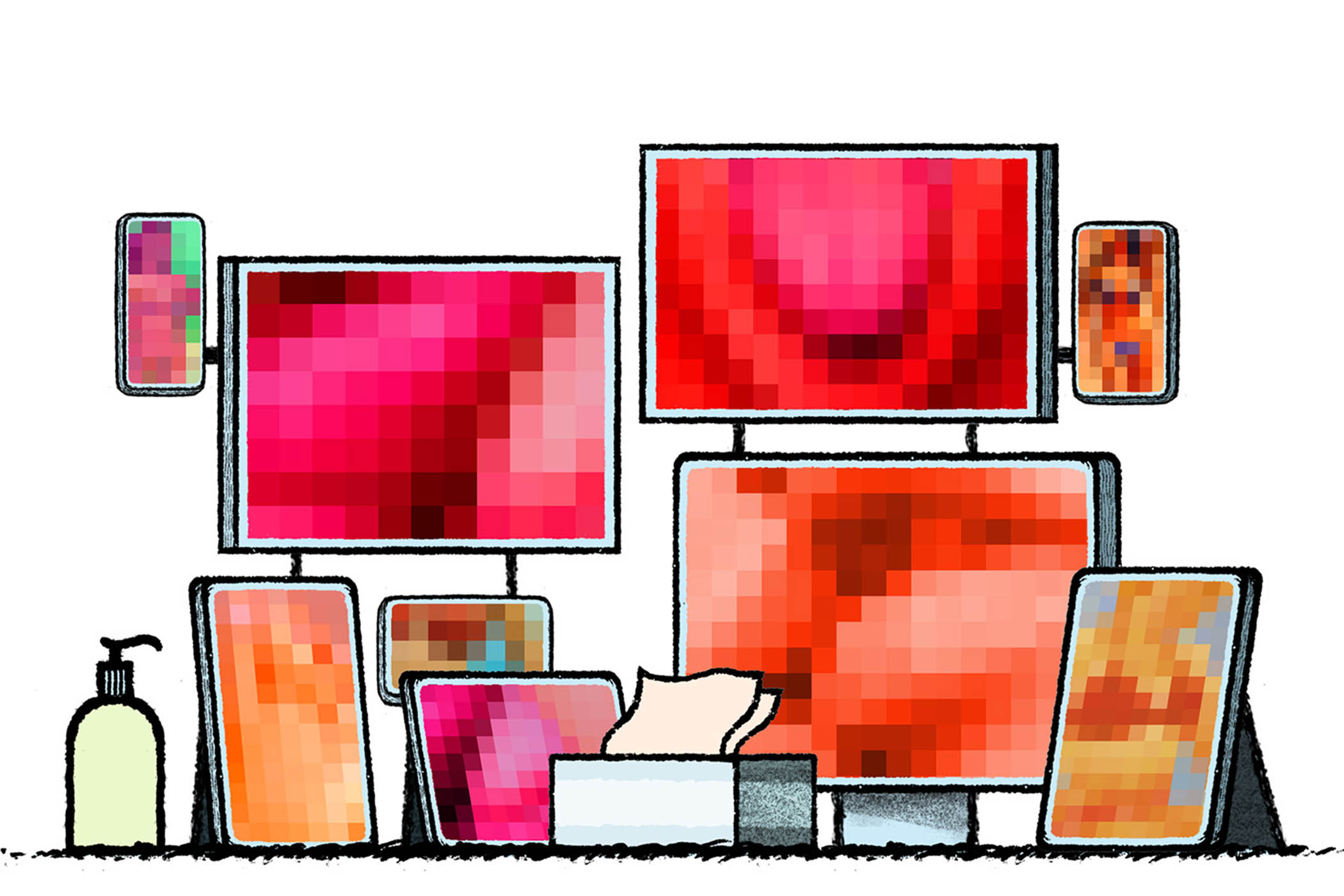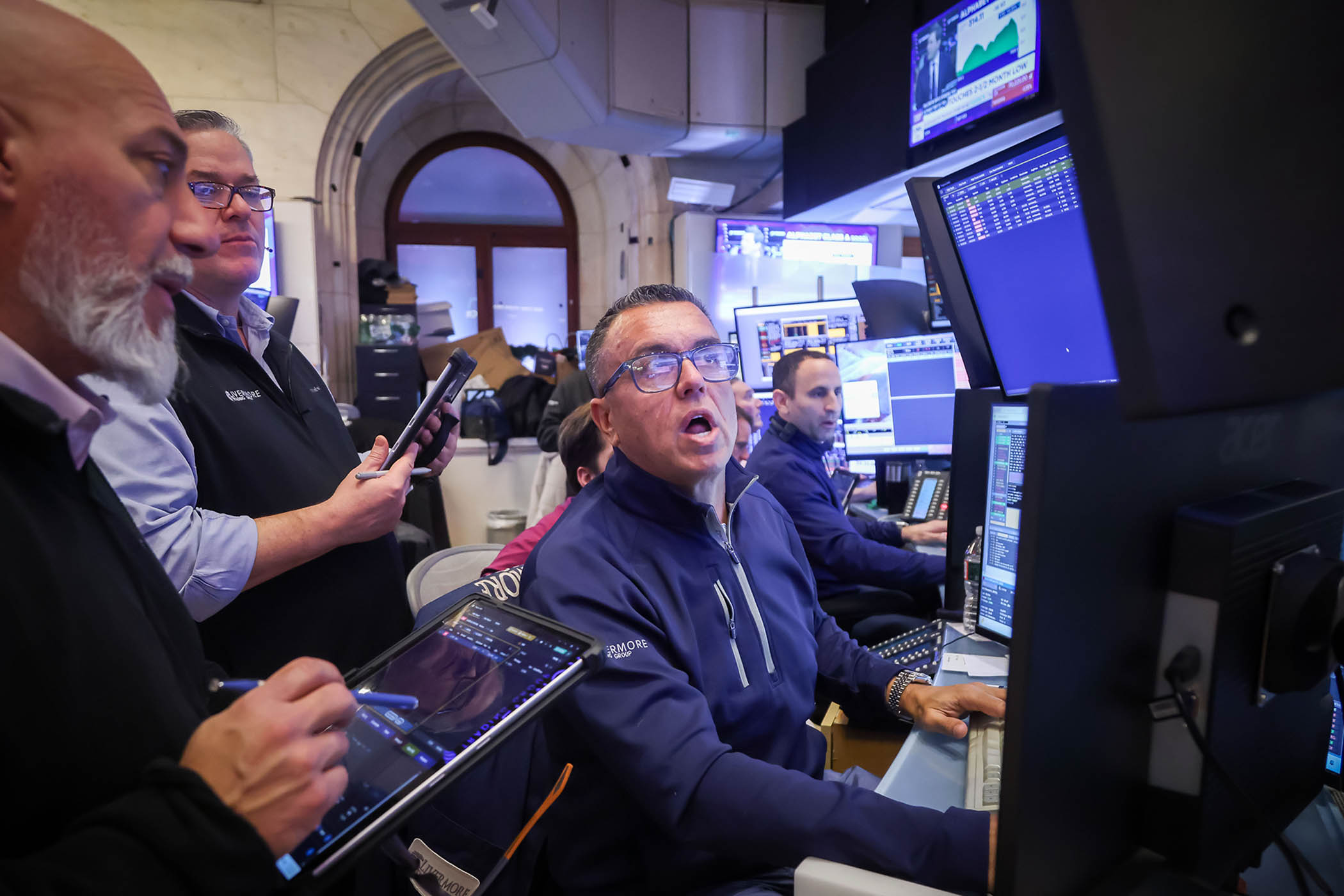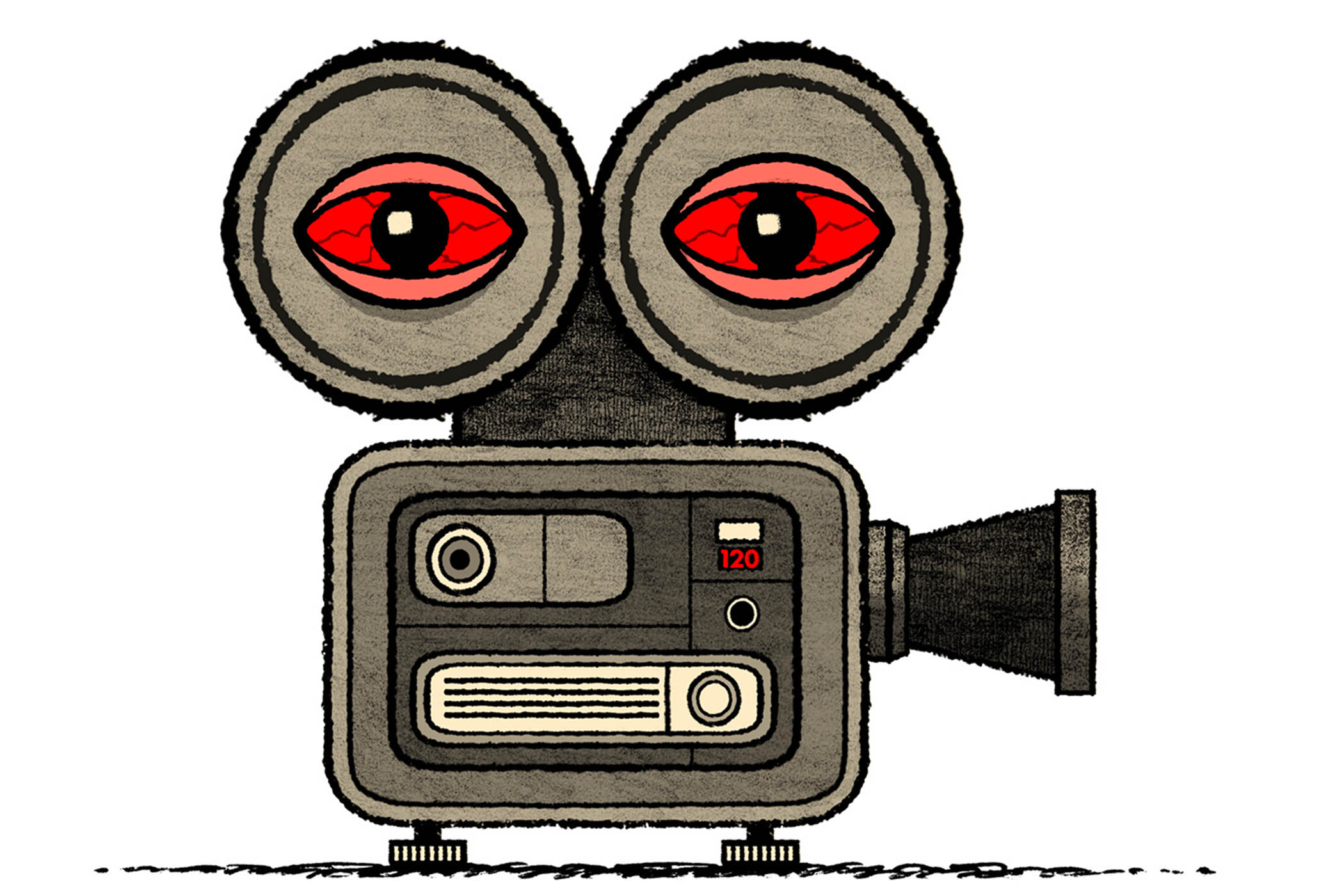Illustration by David Foldvari
Does your house have a gooncave? That you know of? It might be in your basement. You might want to pause here and go to check? All good? OK. If you don’t, congratulations, and here is an explanation: a gooncave is a padlocked fortress hidden inside an otherwise pedestrian family home, somewhere to hide away for hours on end watching online pornography on two or three or four massive screens. You can see pictures of them on Reddit, if you have a strong stomach (I wouldn’t recommend it).
A grim evolution of the nascent days of the internet – a time when your home had a computer room, laughably quaint by today’s standards; a place where you would negotiate hour-long slots with your siblings in which to surreptitiously illegally download enough music to send your hulking PC into cardiac arrest – gooncaves today are populated by the generation after those computer room millennials, or even the generation after them. They’re bleak, obviously. They’re also evidence that, after a period of oversharing and living our whole real, curated, aspirational lives online, the internet is retreating back into its initial secrecy, but turbocharged. We are not at the point where many Gen X parents are going to accidentally stumble across the CCTV-protected fortress of a basement gooncave the way the parents of millennials would have walked in without knocking and then joked about it in perpetuity. For a parent of a teenager, though, the possibility is a terrifying thought. But technology is scary for today’s parents in general.
I don’t know anyone who’s discovered a gooncave in their house. Partly because I don’t know many people who own their own houses. But also because the parents in my life are at a very different stage of child-rearing – right at the very beginning, the stage where birthday parties are excuses to go to the park to get pissed with your friends while a baby obliviously turns one – and they’re using that stage to make absolutely sure they’ll never discover a gooncave in their near or distant future. Whereas Gen X parents have a relatively slack hold over their children’s internet presence, millennials of my acquaintance control it with a vice-like grip from the moment their progeny enter the world. There is a standard of appropriate internet use for millennial parents, a style of posting which is acceptable, which amounts to not much posting at all.
Approved posts may include: a photo leaving the hospital where your baby was born, with the dad holding a carrier, looking back towards the camera; photos of the back of the child’s head; photos of the front of the child’s head, but with their face obscured by emojis such as heart, flower or baby (very dadaist to put an emoji baby face over an actual baby face); very zoomed-in photo of baby toes; very zoomed-in photo of baby hand. You ideally want to create an online reality whereby when a real life friend eventually meets your baby, they will be perplexed to find it has features that weren’t created for iOS 16.
Gen X parents have a slack hold over their children’s internet use, but millennials control it with a vice-like grip
Gen X parents have a slack hold over their children’s internet use, but millennials control it with a vice-like grip
It sounds like I’m being snarky about this – and I am – but I do understand that it comes from a good place. I know – we all know – that the internet is full of strangers, who are scary. Even oversharing, attention-starved millennials grew up with the spectre of stranger danger hanging over them, and understand how worrying it is. There are bad people on the internet, just like there were bad people hanging around on street corners to snatch us up. Perhaps more so. And the children of millennials have not given their consent to be posted all over their parents’ social media. It’s a privacy thing.
But to be more brutal about it, this style of posting is not just about privacy or safety. It’s also revealing of a new kind of aspiration: the privilege of growing up offline. I suspect that the millennial babies in my life and the corners of my Instagram feed, obscured with many emojis, will grow up into children who will be lovingly protected from the dangers of the internet to the point where they will become a sort of neo-luddite. They will be encouraged to partake in sensory play, gentle-parented away from Cocomelon. They will be educated at forest schools – the fees for which, in my local area, can exceed five figures per term (though some branches are free) – and know the value of a good honest hike. Screens will be verboten to the point they will not know how to turn on an iPad.
A few weeks ago, in an interview about her own parenting style, Keira Knightley extolled the virtues of her screen-free home. Her children are banned from social media, she says, and she’s teamed up with the other mums at her kids’ (very nice indeed) school to enforce the same rules in their own homes. Quite right too! Her daughters, Edie and Delilah, will grow up shielded from the “terrifying” and “unregulated” online world. “Most of the parents at the school,” she said, “were in agreement that that’s the way forward.” Jolly good!
This is all lovely and great if you’re Keira Knightley, or Ballerina Farm, or anyone else with the time and money to advocate for this, to be at home all day every day enforcing it, or entrusting your help to do the same. But what about the non-aspirational homes, where screens are everywhere and nobody has the luxury of time to enforce being offline for ever? Where they post shamelessly and know the power and appeal of that show where different fruits and vegetables just bounce and dance (not just good for babies, by the way; also very good for babysitting adults nursing ambient hangovers).
I don’t think these people are bad parents, but it does make me wonder whether this is where the class line is going to be drawn for the next generation. For millennials, aspiration and privilege was based on your access to technology (do you have a pink Motorola Razr? Do you have a laptop? Do you have porn on your iPad Nano?), but for the next generation, aspiration will be performed in the opposite way, on your ability to shun technology: did you do your exams in the woods? Are you lucky enough to have no photos of your awkward stage on your mum’s X account. Are you a terminally online gooncave-dweller? Or are you a neo-luddite?
Newsletters
Choose the newsletters you want to receive
View more
For information about how The Observer protects your data, read our Privacy Policy



